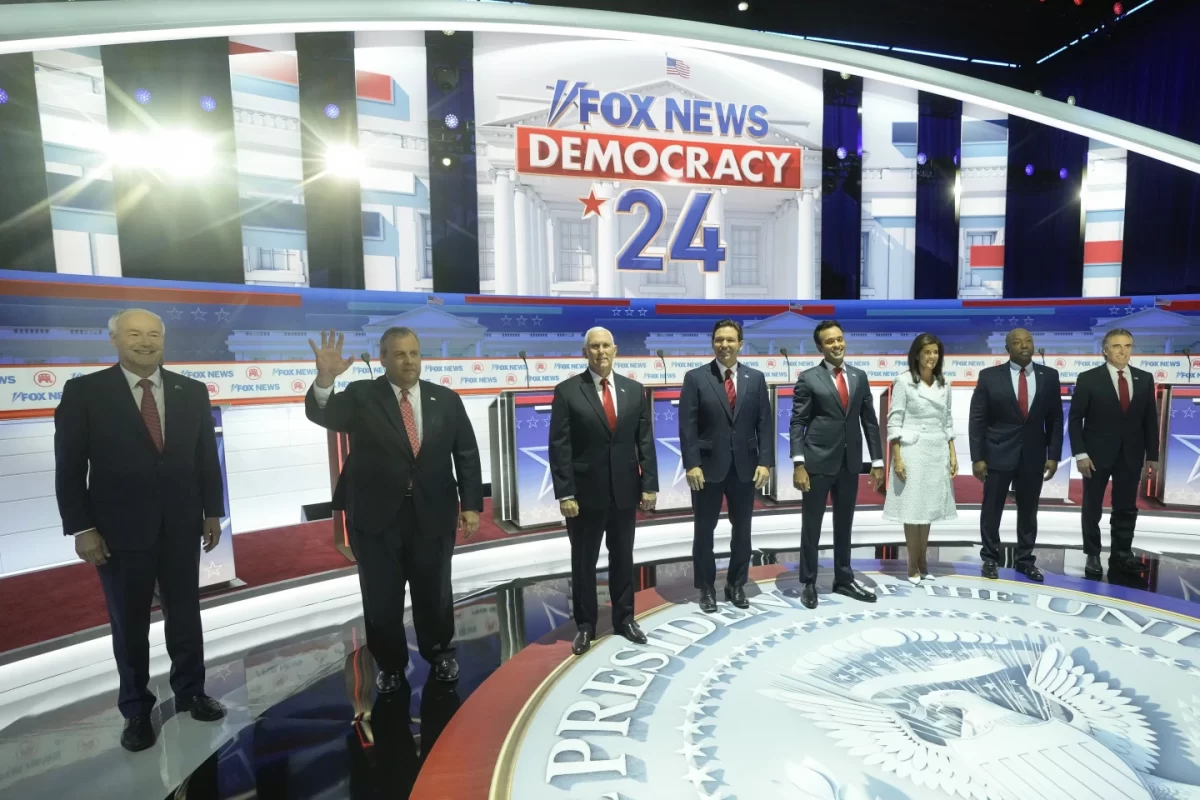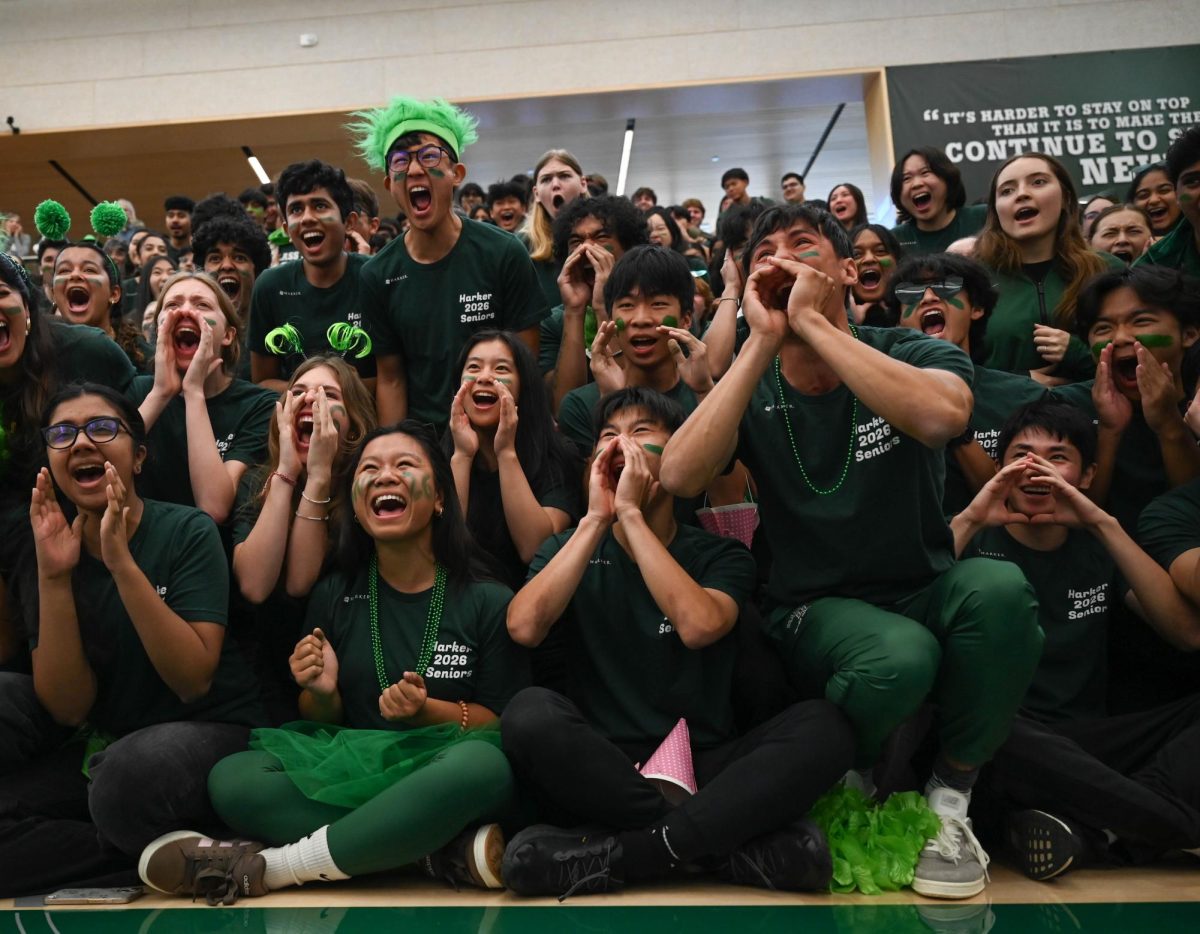Seven candidates vying to become the Republican nominee in the 2024 presidential election clashed on stage at the Ronald Reagan Presidential Library in California on Sept. 27.
An estimated 9.5 million Americans tuned in to watch the second Republican presidential primary debate. Former President Donald Trump once again did not participate as he met with striking auto workers at an automobile factory in Detroit, as was former Arkansas governor Asa Hutchinson, who failed to qualify because he failed to reach the three percent minimum support in the polls.
The candidates argued over a variety of topics ranging from education and health care to crime and government spending in light of the looming government shutdown. President Joe Biden was at the center of criticism for his policies on border security, the most discussed topic in the entire two-hour broadcast, and many onstage accused him of disregarding increasing illegal immigration at the United States-Mexico border.
A wide range of foreign policy issues also took center stage as the presidential candidates discussed their positions on Ukraine and confronting the growing Chinese influence in America and around the globe. Former South Carolina Governor and U.S. Ambassador to the United Nations Nikki Haley firmly reasserted her stance to ban the Chinese company-owned mobile app TikTok in the United States, while also emphasizing the importance of sending weapons and military assistance to Ukraine in order to deter both Russia and China from any further aggression. Civil Discourse Club Outreach Manager Sam Parupudi (11), who watched the debate live, credited Haley for using her past experience in the United Nations to attack other candidates on their approaches to international affairs.
“Nikki Haley was a really big reason why foreign policy was brought up so much,” Sam said. “It’s her strong suit, and that’s why she was so assertive in her arguments about China and Ukraine. The other candidates couldn’t really take such a strong stance like [hers] on China because [China]’s such an important economic partner to us.”
Throughout the debate, moderators Dana Perino and Stuart Varney, both Fox Business political commentators, and Ilia Calderón, an anchor for Spanish-language network Univision, struggled to take control, with candidates repeatedly yelling over each other when arguing over technology, foreign policy and energy development. Upper school history teacher Dr. Chris Gatto felt that the candidates’ desire to stand out to voters led to constant interruptions and created further chaos on the debate stage.
“If you’re a candidate and you just want to have your voice heard, make the headlines and get a clip of yourself online; you do all you can to get face time,” Gatto said. “You do your best to interrupt because you won’t be punished for going against the rules, and so I think all the candidates have an incentive to speak when they’re not supposed to.”
Trump came increasingly under fire from more candidates in this debate as the former president comfortably leads in the polls by more than 40 percent. Florida Gov. Ron DeSantis, who stands in second place, blamed Trump for adding to inflation during his administration and condemned his decision to not attend the debate, stating that the former president was “completely missing in action from leadership [and] owe[d] it to [the American people] to defend his record.” Former New Jersey Gov. Chris Christie, who, unlike the other candidates, has built his campaign around opposing Trump, gave the former president the nickname “Donald Duck” for “hid[ing] behind the walls of his golf clubs.”
Civil Discourse Club member Timothy Deng (10) believed that Trump’s absence would have a negligible effect on primary election results, as the former president’s margin in polls is too large for any other candidate to overcome.
“Although Trump wasn’t there at both this [debate] and the last, he is still by far the most popular candidate in the Republican primary,” Timothy said. “He has massive support among Republicans, and so none of the other candidates are posing a substantial threat to him.”
Sam shared the same sentiment and felt that the debate did not seem like a contest for the Republican nomination.
“It definitely felt more like a race for the vice presidency [under Trump] than to be president,” Sam said. “It seems unlikely that any other candidate besides Trump will win, and so most of them are eyeing to be his vice presidential nominee in the 2024 [presidential] election against Biden.”
Overall, Sam thought that entrepreneur Vivek Ramaswamy produced the strongest performance out of the seven debaters, even though other candidates attacked him for his past business deals in China, due to his memorability and appeal to younger conservative voters.
“It’s only the older generations that are easily fear mongered into being scared of anything related to China,” Sam said. “So I think [Ramaswamy]’s using his status as a breakout star like [former President] Obama did to really speak to a specific demographic of the American population. [Ramaswamy] was able to appeal to younger MAGA populists even in a crowd that was less accepting of radical ideas.”




![LALC Vice President of External Affairs Raeanne Li (11) explains the International Phonetic Alphabet to attendees. "We decided to have more fun topics this year instead of just talking about the same things every year so our older members can also [enjoy],” Raeanne said.](https://harkeraquila.com/wp-content/uploads/2025/10/DSC_4627-1200x795.jpg)


















![“[Building nerf blasters] became this outlet of creativity for me that hasn't been matched by anything else. The process [of] making a build complete to your desire is such a painstakingly difficult process, but I've had to learn from [the skills needed from] soldering to proper painting. There's so many different options for everything, if you think about it, it exists. The best part is [that] if it doesn't exist, you can build it yourself," Ishaan Parate said.](https://harkeraquila.com/wp-content/uploads/2022/08/DSC_8149-900x604.jpg)




![“When I came into high school, I was ready to be a follower. But DECA was a game changer for me. It helped me overcome my fear of public speaking, and it's played such a major role in who I've become today. To be able to successfully lead a chapter of 150 students, an officer team and be one of the upperclassmen I once really admired is something I'm [really] proud of,” Anvitha Tummala ('21) said.](https://harkeraquila.com/wp-content/uploads/2021/07/Screen-Shot-2021-07-25-at-9.50.05-AM-900x594.png)







![“I think getting up in the morning and having a sense of purpose [is exciting]. I think without a certain amount of drive, life is kind of obsolete and mundane, and I think having that every single day is what makes each day unique and kind of makes life exciting,” Neymika Jain (12) said.](https://harkeraquila.com/wp-content/uploads/2017/06/Screen-Shot-2017-06-03-at-4.54.16-PM.png)








![“My slogan is ‘slow feet, don’t eat, and I’m hungry.’ You need to run fast to get where you are–you aren't going to get those championships if you aren't fast,” Angel Cervantes (12) said. “I want to do well in school on my tests and in track and win championships for my team. I live by that, [and] I can do that anywhere: in the classroom or on the field.”](https://harkeraquila.com/wp-content/uploads/2018/06/DSC5146-900x601.jpg)
![“[Volleyball has] taught me how to fall correctly, and another thing it taught is that you don’t have to be the best at something to be good at it. If you just hit the ball in a smart way, then it still scores points and you’re good at it. You could be a background player and still make a much bigger impact on the team than you would think,” Anya Gert (’20) said.](https://harkeraquila.com/wp-content/uploads/2020/06/AnnaGert_JinTuan_HoHPhotoEdited-600x900.jpeg)

![“I'm not nearly there yet, but [my confidence has] definitely been getting better since I was pretty shy and timid coming into Harker my freshman year. I know that there's a lot of people that are really confident in what they do, and I really admire them. Everyone's so driven and that has really pushed me to kind of try to find my own place in high school and be more confident,” Alyssa Huang (’20) said.](https://harkeraquila.com/wp-content/uploads/2020/06/AlyssaHuang_EmilyChen_HoHPhoto-900x749.jpeg)





